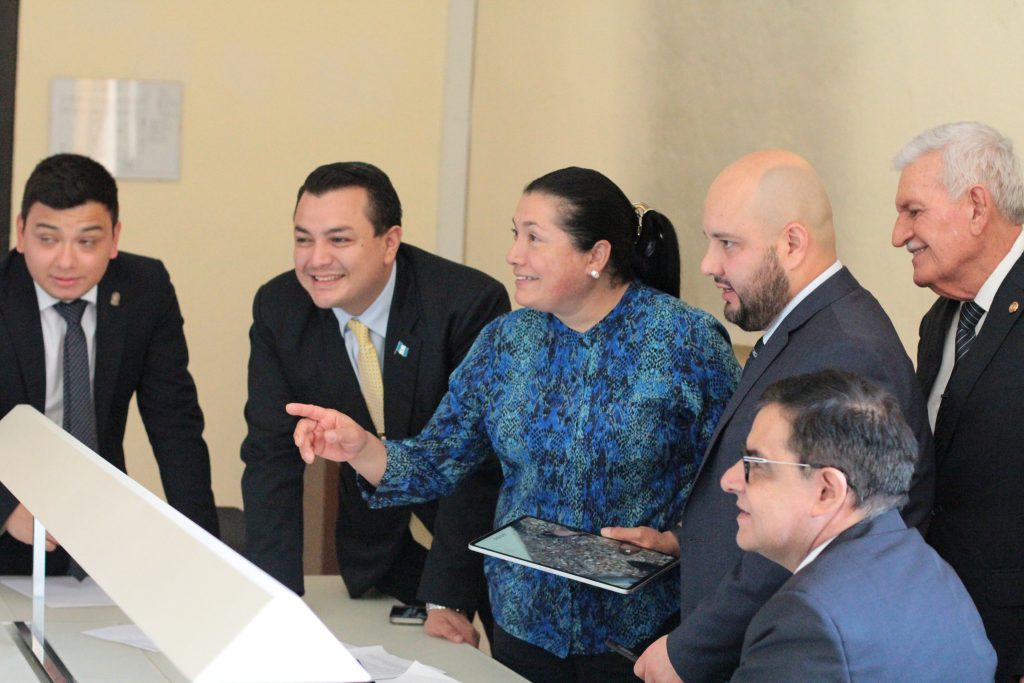Guatemala has recently concluded the electoral cycle of 2023 general elections, which has been – and still is – a though process characterised by a strong polarisation, a divisive political campaign and serious threat to democratic institutions like the one you are leading. What lessons learned do you get from this process?
[Following the process of 2023 general elections, we are now] going through a very difficult political rearrangement in Guatemala, whereby we have many complaints, but we have not been granted the possibility to sit down at a table and be able to resolve issues as people.
At the moment, public policies are problematic, because there is no working consensus with legislative seriousness, with a unity of the executive, legislative, and judicial. And that contributes to hurting the governance of a country. […] I hope that what happened in Guatemala is not repeated in any other country in the world, that we humans, citizens of the world, learn to come to terms with our differences.
If today is Y’s turn to govern, tomorrow it will be X’s, in politics you have to wait your turn. The time may come for all of us to govern, but what is not worth it is that we fight, that we ignore each other. Instead, democracy is about seeking consensus. We are convinced […] that the strengthening of a democratic system […] is about sharing governance equally with everyone. Let’s share it. […] What we cannot help but do is consider the power of dialogue responsibly and sit down and solve our problems.
When thinking of the future of Guatemala, do you see a divisive society with strong narcos infiltration or do you see some seeds of hope of inclusion and participation?
At the moment, the issue of political negotiation is complicated. We know that we Guatemalans are resilient. 99.9% of Guatemalans are people of peace, we like to serve, we like to get along, and we are convinced that soon this legislative conflict will end and that our brothers and sisters in Congress will understand that we are here to serve and govern, and that governance requires maturity.
It also requires ethics and morality, and also that delicate sensitivity of forgetting about what is mine, forgetting about partisan political interests and seeking what I offered on the platform, which is to solve the great problems that we still have as a country. […]
We also have to recognize that this conflict that we have had, electoral and post-electoral, was a pretext for the population, because they may now think “I don’t want to participate, they are going to file a criminal complaint against me, I could go to prison” and this way we are losing leadership, we are losing men and women who have the capacity and have the ethical and moral principles to be able to serve their country. They are ready, but they don’t want to engage. So, we are reawakening them, because the responsibility for governance and democracy does not only fall upon the Supreme Electoral Court and on the political parties alone, but on the Court of the Political Parties and all Guatemalans, and also on the citizens of the world. […]
Now in Guatemala we have to reawaken that sensitivity of not wanting to stay isolated, and instead be involved, give opinions and participate.
Is the Supreme Electoral Tribunal capable to undergo the next challenges represented by a presidency with a small support in the national assembly? In this scenario, what role can the Supreme Electoral Tribunal play in the protection of democratic processes?
Mrs. Gabriela Mistral already said it: if there is no educational process, nothing can happen. The educational process is what allows men and women to learn to remove the blindfold so that we can see clearly, we can feel, and we can have clarity about why we are on this earth. It opens windows for better opportunities, and it makes us feel empathy for others, it makes us resilient and also it gives us opportunity for human development. […]
Today we are seeing that the more educated citizens are, the more they can identify hyper-presidentialism, and they can assess that democracy cannot be similar to that thin guiding thread of authoritarianism.
At the moment, we [at the Supreme Electoral Tribunal] are working on a strategy that we are going to apply to political parties, young people, women, different youth groups that are already involved. We have currently received support from UNDP, where we are training youth, minority groups, our Afro-descendant groups and also indigenous peoples in the 22 departments, to awaken a new generation of men and women with love for the country, with passion and interest in politics.
How important is education on electoral and democratic processes in the framework of a country such as Guatemala? And what is the importance of attending a course like the one organised here at the Global Campus, focusing on technical assistance?
[By attending this course] I have heard from wonderful people who provide technical assistance around the world and who also observe democratic processes around the world. And the more we listen to what is happening in the world, the more we realise it is no different from what is happening in Guatemala. […] Now I am more convinced that I have a responsibility to fight and work more for democracy, for governance, for world peace through courses like this, thanks to Global Campus, and to the wonderful people who do this. […] I recommend this course. I thank you for the invitation and I tell you that it has been one of the most beautiful experiences I have ever had, because I have learned what is happening in Asia, what is happening in Europe, what is happening in Latin America and when we compare them, we realise we have the same need: work together to strengthen democracy.

